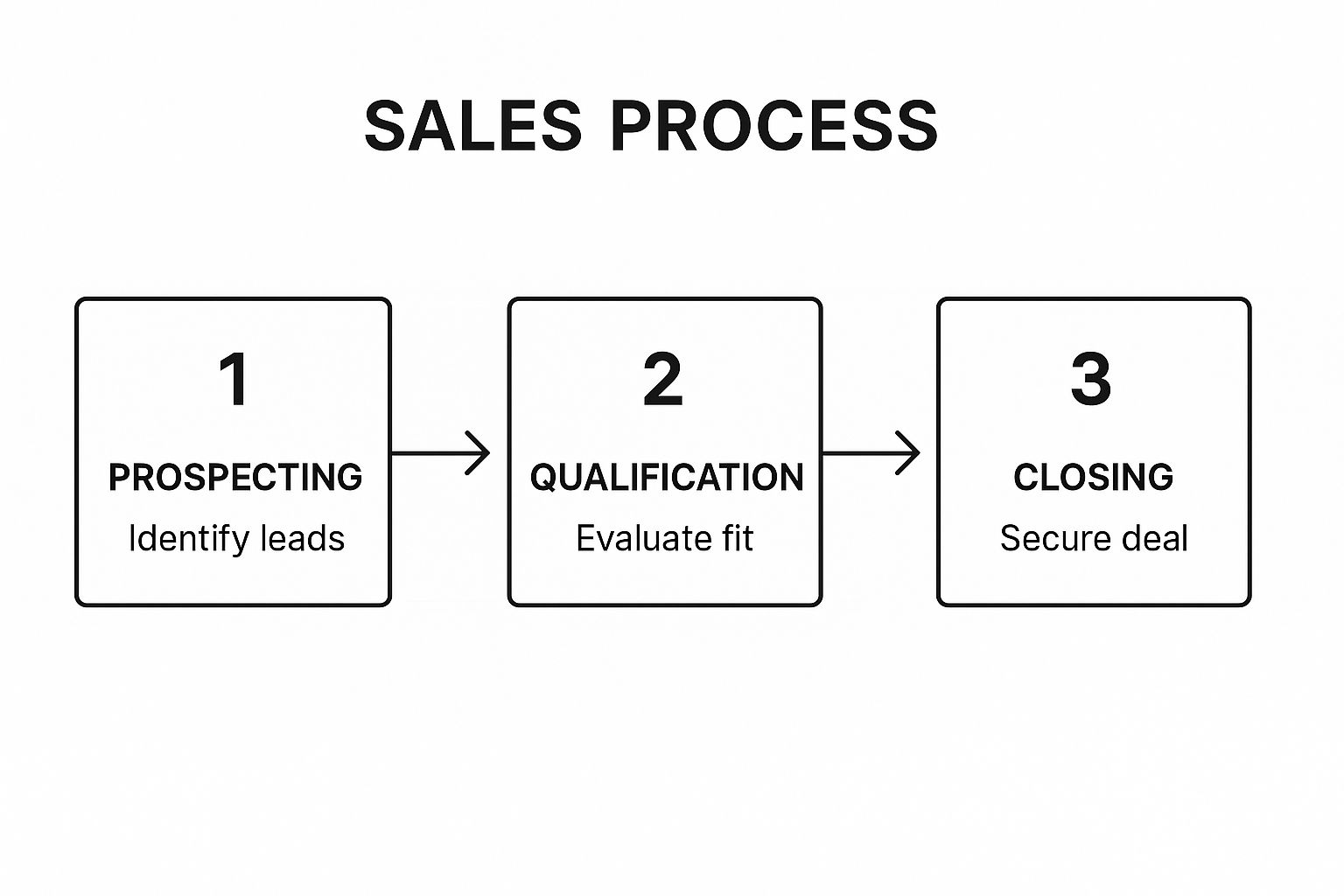Finding the right salesperson is more than a numbers game; it's about identifying resilience, strategy, and a relentless drive to succeed. In a competitive market, asking generic questions simply won't uncover the high-calibre talent you need to grow your field sales team. This guide provides a curated list of essential interview questions on sales, specifically designed to move beyond rehearsed answers and reveal a candidate's true potential. We'll break down why each question matters, what a strong answer looks like, and how to spot critical red flags.
To truly reveal a candidate's past performance and future potential in sales, understanding structured methodologies like competency-based interviewing is a powerful starting point. This framework helps you dig deeper into how a candidate has previously handled real-world challenges. By integrating these targeted behavioural and situational questions into your hiring process, you can build a team equipped to not just meet quotas, but to drive sustainable growth. This article will equip you with the tools to hire performers who will thrive in the field, from door-to-door canvassing to complex B2B negotiations. Let's explore the questions that separate the great from the good.
1. Tell me about your sales experience and track record
This foundational question is often the first one asked, and for good reason. It’s a powerful opener that gauges a candidate's ability to structure their professional story, highlight key achievements, and communicate their value proposition concisely. More than just a recap of their CV, their answer reveals their confidence, industry expertise, and understanding of what truly matters in a sales role: results.

When you ask this, you are not just looking for a chronological list of jobs. You are listening for a narrative of growth, resilience, and consistent performance. This question sets the stage for the entire interview, providing a framework for you to dig deeper into specific deals, strategies, and skills.
What to Look For in an Answer
A strong response will be structured and data-driven. Candidates should avoid vague statements and instead focus on quantifiable achievements that demonstrate their impact.
- Quantifiable Results: Look for specific numbers. An excellent candidate will mention quota attainment percentages, revenue generated, deal sizes, or market share growth.
- Clear Progression: Their story should show a logical career progression, whether it's managing larger territories, selling more complex solutions, or moving into leadership.
- Relevant Experience: The candidate should intelligently connect their past experiences to the specific needs of your company and the role they are interviewing for.
Example of a Strong Answer
“I started my sales career in the telecommunications sector, where I consistently exceeded my quota by an average of 120% over four years. I then transitioned to SaaS, focusing on energy providers. In my last role, I was responsible for a key territory and closed the largest deal in the company’s history last quarter, valued at $250,000 ARR, by developing a custom solution for a solar consultant firm.”
This answer is effective because it is concise, packed with metrics, and demonstrates a clear path of professional growth. It directly addresses their track record and provides a perfect launchpad for follow-up questions. This is one of the most critical interview questions on sales because it immediately separates the high-performers from the rest.
2. How do you handle rejection and maintain motivation?
Sales is a profession built on resilience. This question cuts to the core of a candidate’s mental toughness, emotional intelligence, and self-awareness. How a salesperson handles the inevitable "no" is often more telling than how they celebrate a "yes." Their answer reveals their underlying drive, coping mechanisms, and ability to persist when faced with constant setbacks.

You are looking for a candidate who understands that rejection is part of the process, not a personal failure. Their response should demonstrate a proactive, systematic approach to staying positive and focused. This question helps you gauge whether a candidate will burn out after a tough week or if they have the internal fortitude to maintain high performance over the long term.
What to Look For in an Answer
A strong candidate will provide specific, actionable strategies rather than generic platitudes like "I just stay positive." They should show ownership of their mindset and have a clear system for bouncing back.
- Process-Oriented Mindset: Great reps focus on what they can control, their activities. They might mention focusing on their daily call count or meeting numbers, knowing that consistent effort will eventually yield results.
- Rejection as a Learning Tool: Look for candidates who frame rejection as a data point. Do they analyze why a deal was lost? Do they use the feedback to refine their pitch, handle objections better, or improve their qualification process?
- Specific Motivation Techniques: A prepared candidate will detail their personal motivation rituals, whether it’s reviewing their goals, listening to a specific podcast, exercising, or leaning on their team for support.
Example of a Strong Answer
“I see rejection as feedback. After a lost deal, I have a process where I debrief what went wrong, focusing on what I could have controlled or done differently. I also maintain a strict focus on my activity metrics because I know sales is a numbers game; dwelling on one loss takes time away from the next opportunity. To stay motivated, I start each day by reviewing my long-term goals, which helps put minor setbacks in perspective and keeps me focused on the bigger picture.”
This answer is powerful because it’s systematic, not emotional. It shows the candidate has a mature and professional approach to one of the toughest parts of the job. Understanding these personal drive factors is crucial, and you can explore more about how to motivate a sales team on leadflowmanager.com. Answering this well is a must for anyone facing tough interview questions on sales.
3. Describe your sales process from prospecting to closing
This comprehensive question moves beyond past results to examine a candidate's methodology and strategic thinking. It assesses their ability to manage a full sales cycle, revealing their organisational skills, process discipline, and understanding of each stage from initial contact to a signed deal. A candidate's answer shows whether they are a reactive salesperson or a proactive, systematic professional.
This question uncovers how a candidate thinks and operates. You're not just looking for a list of steps; you're evaluating their strategic approach, their ability to adapt, and their understanding of how to build and maintain momentum throughout a complex sales engagement. It helps you gauge if their process will integrate smoothly with your company's established sales framework.
What to Look For in an Answer
A strong response will be structured, logical, and demonstrate a clear, repeatable process. Top candidates will reference specific methodologies, tools, and metrics they use to guide their actions at each stage of the sales funnel.
- Systematic Approach: They should be able to articulate distinct stages, such as prospecting, qualification, discovery, proposal, negotiation, and closing.
- Methodology-Driven: Look for references to established frameworks like BANT, MEDDIC, or SPIN Selling, which show a disciplined and educated approach.
- Tool Proficiency: A great candidate will mention the CRM, sales engagement platforms, and other technologies they use to manage their pipeline and automate tasks.
This infographic outlines the core, high-level stages of a typical sales process.

This visualization simplifies the sales journey into its fundamental components, providing a clear framework for discussing the detailed activities within each phase.
Example of a Strong Answer
“My process is built on the Challenger Sale methodology. I start with prospecting by identifying companies in our ICP that are showing intent signals, using tools like LinkedIn Sales Navigator. For qualification, I use the BANT framework to ensure I'm spending time on viable opportunities. In the discovery phase, I focus on asking insightful questions to understand their core business challenges. From there, I build a tailored proposal that directly links our solution to their pain points, and then I move into negotiation and closing. I manage this entire process in our CRM, tracking conversion rates at each stage to identify any bottlenecks.”
This answer is effective because it names a specific methodology, mentions tools, and describes a logical, step-by-step process. This is one of the key interview questions on sales as it proves the candidate has a reliable and structured system for generating results.
4. How do you research and qualify prospects?
This question dives into a candidate’s process and strategic thinking. An effective sales professional doesn’t just make calls; they make the right calls. Their answer reveals their methodology for identifying high-potential leads, their ability to use modern sales tools, and their understanding of how to align their efforts with the company's ideal customer profile (ICP).

When you ask this, you are assessing their resourcefulness and efficiency. A top performer has a system to avoid wasting time on unqualified leads, ensuring their pipeline is filled with opportunities that have a genuine chance of closing. This question helps you understand their tactical skills and their strategic approach to territory management and pipeline generation.
What to Look For in an Answer
A strong answer will detail a systematic, multi-faceted approach that combines research with a structured qualification framework. Candidates should demonstrate both diligence and efficiency.
- Specific Tools and Techniques: Look for mentions of specific platforms like LinkedIn Sales Navigator, company databases, or CRM data, and how they use them to gather intelligence.
- Clear Qualification Criteria: An excellent candidate will reference a known framework (like BANT, MEDDIC, or CHAMP) or their own well-defined criteria for what makes a lead worth pursuing.
- Strategic Approach: They should connect their research to their outreach, explaining how they use gathered information to personalise their messaging and build rapport.
- Balance of Quality and Quantity: Their process should show they value deep research without falling into "analysis paralysis," maintaining a healthy volume of sales activity.
Example of a Strong Answer
“My process starts with our Ideal Customer Profile. I use LinkedIn Sales Navigator to build lists of target accounts and key decision-makers who fit that profile. Before any outreach, I review the company’s recent news, annual reports, and the contact's recent activity to find a relevant conversation starter. For qualification, I rely on the BANT framework to quickly assess budget, authority, need, and timeline. This ensures I'm spending my time on prospects who have a real, solvable problem and the resources to act.”
This answer is effective because it outlines a clear, repeatable process that is both strategic and practical. It showcases the candidate's use of modern tools and a proven qualification methodology, making it a key part of evaluating them for any list of interview questions on sales. A solid understanding of this process is crucial, and you can learn more about what is lead qualification on LeadFlowManager.com.
5. Tell me about your biggest sales win and how you achieved it
This question moves beyond consistent performance to explore a candidate's peak capabilities. It’s designed to uncover their strategic thinking, problem-solving skills, and resilience when faced with a complex, high-stakes opportunity. Their answer reveals the full scope of their sales process, from initial prospecting to closing, and showcases their ability to orchestrate a major success.
When you ask this, you are inviting the candidate to tell a story. You're looking for a detailed account of a challenging and significant achievement that demonstrates not just what they did, but how and why they did it. This insight is crucial for understanding if their methods and mindset align with your team's sales culture and objectives.
What to Look For in an Answer
A compelling answer will go beyond the final dollar amount and detail the journey. It should highlight strategic planning, obstacle navigation, and personal initiative.
- Strategic Depth: The candidate should articulate the specific strategy they developed. Did they build relationships across multiple departments, create a custom solution, or outmanoeuvre a key competitor?
- Problem-Solving: Strong answers will clearly define the challenges they faced, such as a reluctant stakeholder or a technical hurdle, and explain the precise steps they took to overcome them.
- Ownership and Impact: Listen for "I" statements that clarify their specific contributions versus the team's. They should be able to quantify the win’s impact on the company, the client, and their own targets.
Example of a Strong Answer
“My biggest win was a $1M software deal with a major logistics firm that was a long-time client of our main competitor. I spent six months building relationships with mid-level managers to understand their operational pains, which the incumbent was ignoring. I used that insight to build a custom business case for the COO, demonstrating a 20% efficiency gain. The key was turning internal advocates into champions who sold the solution for me. It was a complex, nine-month cycle that ultimately displaced a major industry player.”
This answer is powerful because it details strategy (relationship building, custom business case), identifies the obstacle (entrenched competitor), and shows clear ownership and a successful outcome. This is one of the most revealing interview questions on sales as it spotlights a candidate’s ability to manage a long and complex sales cycle to victory.
6. How do you handle price objections and negotiate deals?
This is where the rubber meets the road. A candidate’s response to this question reveals their ability to defend value, maintain profitability, and steer a conversation away from a race to the bottom. It directly tests their resilience, strategic thinking, and understanding of value-based selling principles versus simply discounting to close a deal.
When you ask this, you're assessing more than just negotiation tactics. You are evaluating whether the candidate can confidently articulate your product's value proposition under pressure and transform a price-focused discussion into a value-focused partnership. Their answer demonstrates if they are a true consultant or merely a transactional order-taker.
What to Look For in an Answer
A top-tier candidate will frame their response around understanding the customer's hesitation and reinforcing the solution's value. They should demonstrate a structured approach rather than an improvised one.
- Value-Centric Approach: The best reps pivot from price to ROI. They should talk about reframing the conversation around the cost of inaction or the long-term benefits the solution provides.
- Empathy and Curiosity: A great answer will start with seeking to understand the objection. Are they comparing apples to oranges? Is it a cash flow issue? Or are they just testing the waters?
- Creative Negotiation: Look for solutions beyond discounting. This could include discussing different payment terms, adjusting the scope of the package, or offering a phased implementation to de-risk the investment.
- Preparation: Strong candidates will mention preparing for these conversations by knowing their numbers, understanding competitor pricing, and having case studies or testimonials ready to justify the cost.
Example of a Strong Answer
“When a client raises a price objection, my first step is always to listen and validate their concern without getting defensive. I'll often say, 'I understand, and it's important that this is a sound financial decision for you.' Then, I'll ask clarifying questions to understand the root of the objection. Often, it's not about the absolute price but about the perceived value. I then pivot the conversation back to the specific outcomes we discussed, quantifying the ROI and how our solution helps them achieve their goals in a way competitors can't. If it's a genuine budget constraint, I'm prepared to discuss flexible payment terms or a phased rollout rather than just cutting the price.”
This response is excellent because it showcases a repeatable, customer-centric process. It demonstrates empathy, strategic questioning, and a firm commitment to defending value, making it a key part of evaluating candidates with interview questions on sales. A salesperson with this methodical approach can be trusted to protect your company's margins while building strong client relationships. For more insights, you can explore detailed strategies for handling sales objections on leadflowmanager.com.
7. How do you stay current with industry trends and continue learning?
The sales landscape is in a constant state of flux. This question probes beyond a candidate's current skill set to assess their commitment to future growth, adaptability, and intellectual curiosity. It reveals whether they are a passive participant in their industry or an active, engaged professional who understands that continuous learning is non-negotiable for long-term success.
A candidate’s answer to this question shows you their proactivity and resourcefulness. Top performers don’t wait to be trained; they actively seek out knowledge to gain a competitive edge, better understand their customers' evolving needs, and refine their sales methodologies. This mindset is crucial for navigating market shifts and new technologies.
What to Look For in an Answer
A strong response will go beyond a simple "I read articles." It should detail specific resources, routines, and, most importantly, how the candidate applies that new knowledge to their sales process.
- Specific Resources: Look for mentions of particular industry publications, podcasts, influential thought leaders, or specific training courses they've completed.
- Active Engagement: Great candidates don't just consume information; they engage with it. They might attend webinars, participate in industry forums, or network at conferences.
- Application of Knowledge: The most impressive answers connect learning directly to results. How did a new insight from a book or seminar help them close a deal or overcome an objection?
Example of a Strong Answer
"I dedicate time each week to professional development. I follow key industry analysts on LinkedIn and subscribe to newsletters like the Harvard Business Review to stay on top of broad market trends. Last month, I completed a certification in challenger sales methodology, which directly helped me reframe a conversation with a prospect who was stuck on price. By teaching them about an industry risk they hadn't considered, I shifted the focus to value and successfully closed the deal."
This response is excellent because it names specific resources, shows a routine, and provides a clear example of applying new knowledge to achieve a sales outcome. It makes this one of the most insightful interview questions on sales for identifying a forward-thinking and adaptable team member.
7-Point Sales Interview Questions Comparison
table block not supported
From Questions to Conversions: Building Your Winning Sales Team
Navigating the hiring process for a sales role can feel like searching for a needle in a haystack. The questions detailed throughout this article are more than just conversation starters; they are strategic diagnostic tools. By moving beyond generic inquiries like "What are your strengths?" you unlock a deeper understanding of a candidate's real-world capabilities. Integrating these carefully selected interview questions on sales into your hiring framework transforms it from a guessing game into a predictable system for identifying top-tier talent.
The goal is to move past rehearsed answers and uncover the underlying attributes that define an exceptional sales professional. You're not just evaluating their past wins; you're assessing their resilience in the face of rejection, their methodology for building a pipeline, and their commitment to self-improvement. These are the non-negotiable traits that separate average performers from the A-players who will drive your revenue growth.
